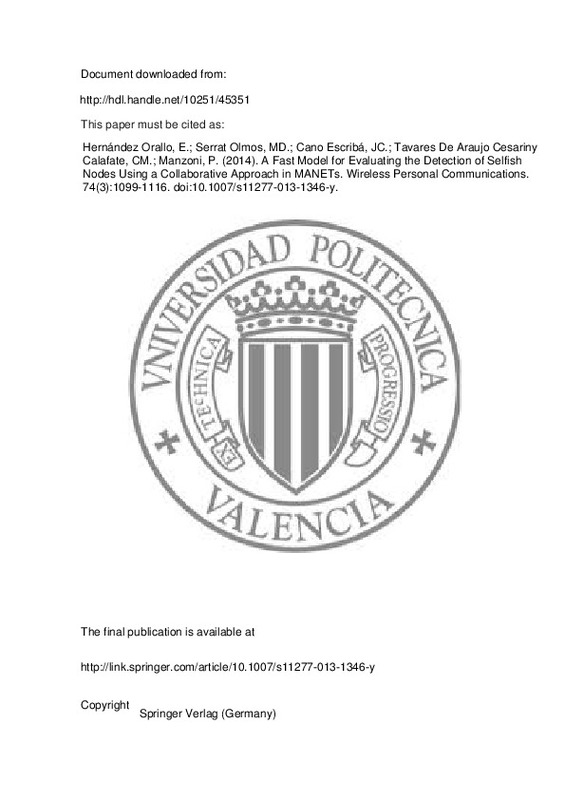Bohnenkamp, H., & Haverkort, B. (2002). The mean value of the maximum. In APM-PROBMIV, LNCS, (Vol. 2399, pp. 37–56). Springer.
Buchegger, S., & Le Boudee, J. Y. (2005). Self-policing mobile ad hoc networks by reputation systems. Communications Magazine, IEEE, 43(7), 101–107.
Gao, W., Li, Q., Zhao, B., & Cao, G. (2009). Multicasting in delay tolerant networks: A social network perspective. In Proceedings of MobiHoc ’09, (pp. 299–308).
[+]
Bohnenkamp, H., & Haverkort, B. (2002). The mean value of the maximum. In APM-PROBMIV, LNCS, (Vol. 2399, pp. 37–56). Springer.
Buchegger, S., & Le Boudee, J. Y. (2005). Self-policing mobile ad hoc networks by reputation systems. Communications Magazine, IEEE, 43(7), 101–107.
Gao, W., Li, Q., Zhao, B., & Cao, G. (2009). Multicasting in delay tolerant networks: A social network perspective. In Proceedings of MobiHoc ’09, (pp. 299–308).
Groenevelt, R., Nain, P., & Koole, G. (2005). The message delay in mobile ad hoc networks. Performance Evaluation, 62, 210–228.
Hollick, M., Schmitt, J., Seipl, C., & Steinmetz, R. (2004). On the effect of node misbehavior in ad hoc networks. In Proceedings of IEEE international conference on communications, ICC’04 (pp. 3759–3763). IEEE.
Hortelano, J., Cano, J. C., Calafate, C. T., de Leoni, M., Manzoni, P., & Mecella, M. (2010). Black hole attacks in p2p mobile networks discovered through bayesian filters. In P2P collaborative distributed virtual environments (P2P CDVE 2010).
Hortelano, J., Ruiz, J. C., & Manzoni, P. (2010). Evaluating the uselfusness of watchdogs for intrusion detection in vanets. In ICC’10 workshop on vehicular networking and applications.
Hui, P., Crowcroft, J., & Yoneki, E. (2008). Bubble rap: Social-based forwarding in delay tolerant networks. In Proceedings of MobiHoc ’08 (pp. 241–250). ACM.
Karagiannis, T., Le Boudec, J. Y., & Vojnović, M. (2007). Power law and exponential decay of inter contact times between mobile devices. In Proceedings of MobiCom ’07 (pp. 183–194).
Karaliopoulos, M. (2009). Assessing the vulnerability of DTN data relaying schemes to node selfishness. Communications Letters, IEEE, 13(12), 923–925.
Kargl, F., Klenk, A., Schlott, S., & Weber, M. (2004). Advanced detection of selfish or malicious nodes in ad hoc networks. In Proceedings of the 1st European on security in ad-hoc and sensor networks (ESAS 2004) (pp. 152–165). Springer.
Li, Q., Zhu, S., & Cao, G. (2010). Routing in socially selfish delay tolerant networks. In Proceedings of INFOCOM’10 (pp. 857–865). IEEE Press, Piscataway, NJ, USA.
Li, Y., Su, G., Wu, D., Jin, D., Su, L., & Zeng, L. (2011). The impact of node selfishness on multicasting in delay tolerant networks. Vehicular Technology, IEEE Transactions on, 60(5), 2224–2238.
Marti, S., Giuli, T. J., Lai, K., & Baker, M. (2000). Mitigating routing misbehavior in mobile ad hoc networks. In Proceedings of MobiCom ’00 (pp. 255–265).
Palazzo, S., Campbell, A. T., & Dias de Amorim, M. (February, 2011). Opportunistic and delay-tolerant networks. EURASIP Journal on Wireless Communications and Networking, 2011, 2 pp. doi: 10.1155/2011/164370 .
Paul, K., & Westhoff, D. (2002). Context aware detection of selfish nodes in dsr based ad-hoc networks. In Proceedings of IEEE Globecom.
Toh, C., Kim, D., Oh, S., & Yoo, H. (2010). The controversy of selfish nodes in ad hoc networks. In Proceedings of IEEE international conference on advanced communication technology (IEEE ICACT Conference) (Vol. 2, pp. 1087–1092).
Zhu, H., Fu, L., Xue, G., Zhu, Y., Li, M., & Ni, L. M. (2010). Recognizing exponential inter-contact time in vanets. In Proceedings of INFOCOM’10 (pp. 101–105). IEEE Press.
[-]







![[Cerrado]](/themes/UPV/images/candado.png)


